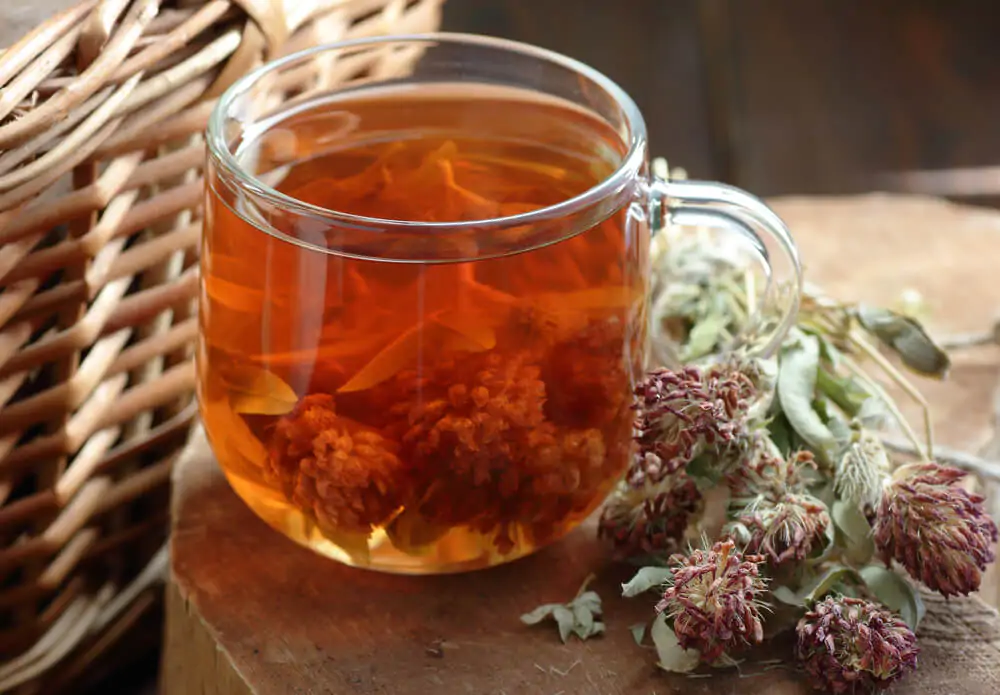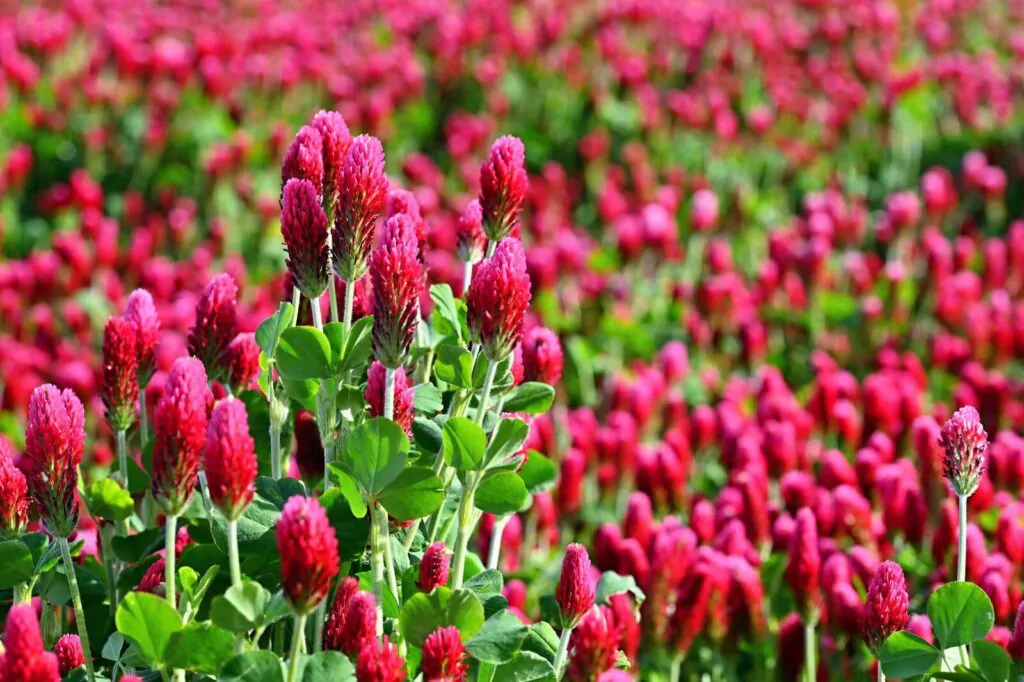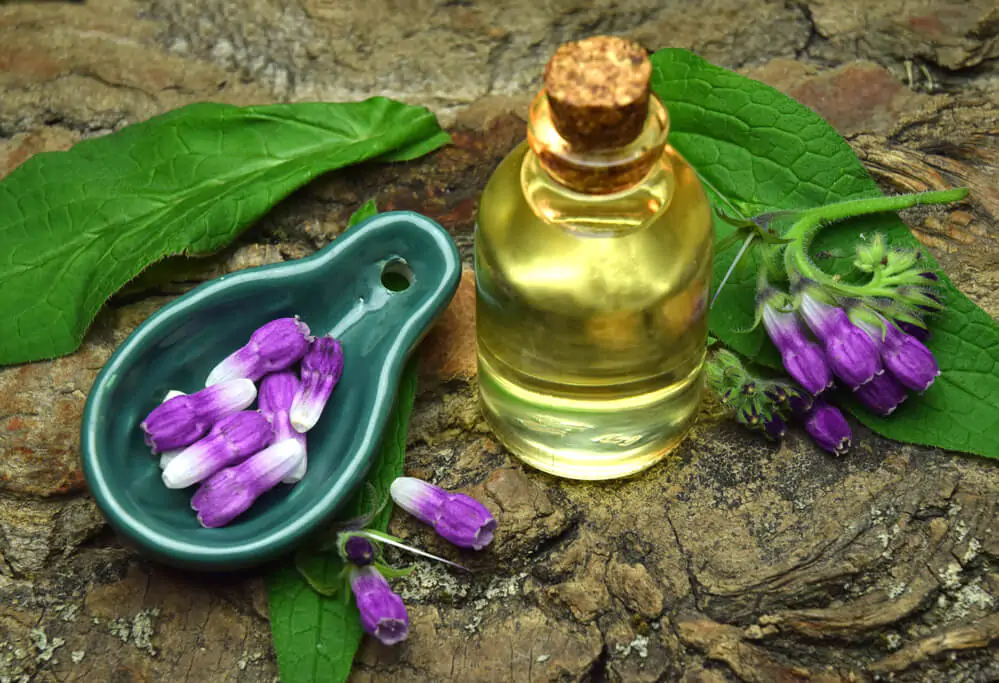Red clover is an herbaceous plant consumed in multiple forms, tea being amongst the most popular. What is red clover tea for? It’s most notable for its positive effects on women’s health issues, respiratory problems, skin disorders, and inflammation.

Red clover tea originated centuries ago as ancient medicine. There are numerous claims about how it may affect the human body, most notably, a woman’s body as it has estrogenic properties.
Additionally, it might be able to assist with other common ailments, being a natural anti-inflammatory. Here, I will tell you all about red clover, how you can take it, and if there are any side effects.
Red Clover Origins
Red clover, also known as Trifolium pratense, is a wild herbaceous plant from the legume family. It is common in South America to improve soil quality. It traveled to North America around the mid-1600s.
Red Clover has brightly-colored flowers that are a rich source of isoflavones, chemicals similar to estrogen that you can find in many plants.

Many nutrients are available in red clovers, such as phosphorus, chromium, calcium, thiamine, magnesium, vitamin C, potassium, and niacin. You can also use the flowers as a garnish or extract them as an additive to essential oils.
You might also be interested in our Iaso tea guide.
Red Clover Tea Medicinal Uses
Red clover is a treatment option for the following conditions:
- Cancer
- Skin disorders (psoriasis and eczema)
- Respiratory issues (whooping cough, bronchitis, and asthma)
- Inflammatory conditions (osteoporosis and arthritis)
- Women’s health problems (symptoms related to menstruation and menopause)
While it’s never recommended to rely on supplements and teas for medical treatment, red clover tea may ease symptoms in the above conditions. There is no definitive link between these medical concerns and red clover at this time, yet trials are promising.
Menopausal Symptoms
Small studies conducted within the last ten years have tested the effect of red clover when administered to women facing symptoms of menopause, specifically hot flashes.
There is anecdotal evidence to support the claims that it alleviates the symptoms, but there haven’t been any studies to confirm the veracity of such claims.
Bone Loss
There is continued research regarding how effective isoflavones are in reducing bone mineral density loss in postmenopausal women. A study concluded in 2016 shows promise that there could be beneficial effects that improve bone health.
Cancer
According to preliminary research, red clover might help lower the risk of contracting prostate cancer, according to preliminary research.
Using cancer cells, a lab study conducted in 2009 discovered that using red clover caused a decrease in PSA (prostate-specific antigen). Researchers found this protein in high levels for men with prostate cancer, suggesting that the cells weren’t as active in those consuming red clover.
How to Make Red Clover Tea
First, take some red clover tea bags or four grams of dried flower tops, add them to 250ml of boiling water, and allow the tea bags or flower tops to steep for five to ten minutes.
As a result of reports that side effects have developed for individuals consuming five cups (1.2 liters) daily, we recommend limiting your red clover tea intake to one to three cups per day.
Although many people love red clover tea, there isn’t any substantial data suggesting that it has the same health effects as red clover in its concentrated forms, such as extracts and supplements.

Loose-leaf red clover tea comes from the entire dried flowers with the upper leaves and stems intact. The aesthetics of the clover flowers make for a beautiful display. The color of the petals can vary between bright orange and subtle pink with a grayish-green background.
Your senses will be fascinated by this beautiful flower’s subtle, earthy, and subtly sweet flavors.
When Not To Use Red Clover
Red clover behaves similarly to estrogen, and as a result, it could hormone balances in pregnant or breastfeeding women.
Any hormone-sensitive disorders such as uterine cancer, endometriosis, uterine fibroids, or breast cancer may be affected by red clover, as they may be with an increase in estrogen. Anyone doing hormone replacement therapy or having a bleeding disorder should consider avoiding red clover.
If you are interested in teas with health benefits, follow the link to read our article about what is linden tea. You may also enjoy finding out what is spearmint tea.
